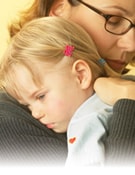When to Get Medical Help for Fluid Loss
Caring for Someone Sick at Home
When to Get Medical Help for Fluid Loss
While anyone can become dehydrated, infants, children, and older adults are at greatest risk of getting dehydrated. Also, pregnant women will want to make sure they are getting enough fluids.
When to call the doctor to ask for advice
Call right away if you or your child has any of these symptoms of dehydration:
Signs of dehydration in infants and toddlers:
- Sunken soft spot on top of your infants head
- Diarrhea or vomiting in infants 2 months or younger
- The baby seems much less active or more irritable than normal
- Fewer tears when crying or not making tears
Signs of dehydration in children and adults:
- Not making tears
- Less than normal amount of urine. In babies you may see fewer wet diapers or diapers that weigh less than normal
- Skin that is dry and takes long to go back to position when pinched
- Dry mouth or dry eyes
- Fast-beating heart
- Blood in the stool or blood in vomit
- The child has had a fever for 12 or more hours and also is not able to drink fluids, throwing up or having diarrhea
- The child may be cranky or irritable, hard to wakeup, have little energy, appear doll weak

